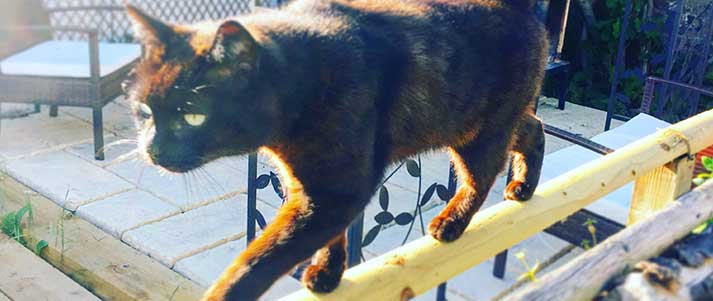How to make money pet sitting

by Jess Miller in Jobs & Careers, Make Money
Updated by Nele van Hout
27 October 2021 ShareTweet
Are you missing the family pet now you’re at uni? Getting paid to cuddle cute, furry animals with pet sitting jobs could be the answer.
Credit: asia.marangio – Shutterstock
Our National Student Money Survey showed that 66% of students have a part-time job to get by at university. But, unfortunately, some student jobs just don’t fit with uni schedules, and employers aren’t always the most flexible.
Pet sitting lets you set your own hours and your own pay, meaning you could end up earning £40 or more each day. Not to mention, there’s the nice little bonus of earning money to spend time with your favourite animals…
Interested? We thought so. This guide has everything you need to know about becoming a pet sitter. Plus, it includes some pictures of our pets that you won’t want to miss.
What’s in this guide?
- What is pet sitting?
- Pros and cons of pet sitting jobs
- Do you need a license to become a pet sitter?
- Do you need insurance to be a pet sitter?
- How much money can you make from pet sitting jobs?
- How to become a pet sitter
If pet sitting is a little too small-time for you, check out our interview with a student who owns and runs her own alpaca farm.
What is pet sitting?

When they ask who’s a good boy, and you know it’s you
Pet sitting is a lot like working as a babysitter – except you’re looking after someone’s pet, and not their child. Makes sense.
Some pet owners prefer to have someone look after their furry bundle of joy instead of using a cattery or kennel. This could be for a number of reasons – perhaps paying someone to sit is cheaper, or their pet gets stressed being away from home.
Depending on the job, you could find yourself looking after the animal at either the owner’s house or your own place.
If you’ve only got a few hours spare and can’t commit to several days of care, there are other options. You could become a dog walker, start a doggy daycare centre at your house or just keep pets company during the day while their owner is working.
In a nutshell, you need to feed them, play with them and keep them safe – just like your own animal.If your parents are going away, you could offer to stay at home and petsit for them for a little bit of cash. This is one of many great ways to make money from helping your parents.
5 best and worst parts of pet sitting
If you’re interested in making money as a pet sitter, it’s important to know these pros and cons:
Pros

Jess‘ cats, Nuschka and Shiva, looking adorable (those eyes!)
Here are some advantages that come with being a pet sitter:
- You get to look after animals and get paid for it.
- If you want to work with animals in the future, pet sitting will look brilliant on your CV – especially if you can get references from happy customers.
- Pets may need to be fed at a certain time, so you need to get there on time – a great way to encourage time management and organisation.
- You can work whenever you want and choose your hourly pay.
- Spending time with animals can boost your mood and academic performance.
Cons

It’d been a long day at the office for Harry
But there are also some disadvantages of being a pet sitter:
- Work may be sparse – it depends on where you are, and if anyone else is offering a similar service.
- You may be expected to give pets medication if required (which, in case you didn’t already know, is something they don’t tend to enjoy).
- Pet owners may be fussy. Understandable, yes, but does Fido really need to be fed boiled chicken, hand-cut into one-inch pieces, and for you to make whale noises to get him to sleep?
- You may need a car to pick up and drop off animals if you are pet sitting in your own home.
- If you use a website to find pet sitting jobs near you, expect them to take a fee for advertising.
Do you need a licence to be a pet sitter?

Bonnie the vizsla’s favourite things are sleep, food and selfies
Technically, you don’t necessarily need a licence to be a pet sitter. But, if you’re going to be caring for other people’s pets in your own home, you will need an animal boarding establishment licence.
While the rules on this licence vary from council to council, you’ll almost always need one if you’re keeping animals in your home overnight, and sometimes for daytime care, too.
The cost of an animal boarding establishment licence also varies depending on the council, usually costing anywhere between £50 – £400. While that may seem expensive, being caught without a licence can result in a fine of an unlimited amount or imprisonment for up to 6 months.
In short, it’s definitely worth getting an animal boarding establishment licence, or at least checking if you need one. You can find more information about this licence here or at the website of your local council.
You may also need a basic DBS check – especially if you will be staying in another person’s house. You can apply for a DBS check here.
Other than that, there are no official qualifications needed to be a pet sitter in the UK – so, in theory, anyone can do it. That said, there’s no harm in having some relevant experience or qualifications to help set yourself apart from the crowd.
While we’re not expecting you all to be vet students (although if you are, that’ll stand you in good stead), make sure your pet sitting profile mentions the experience that you do have. So if you’ve had pets from a young age, learned to ride horses or regularly walk the neighbour’s dog, mention it – it all shows that you’re good with animals.
Do you need insurance to be a pet sitter?

Oh, can’t you walk on fences, too?
While you don’t necessarily need to have insurance to be a pet sitter, a lot of owners will appreciate it if you do.
Aside from showing potential customers that you’re a conscientious and responsible pet sitter, it will also protect you if anything goes wrong.
Depending on the package you go for, you could be covered for a range of things. This includes if the animal falls ill or passes away in your care, if the animal damages a third party or their property, and even if you lose the keys to the owner’s house (if you’re given them in the first place).
Packages can start from around £5 a month, and given how much you can earn from pet sitting (and the potential cost to you if something bad happens), we’d definitely recommend taking out some cover.
How much do pet sitters make?

You’re doing amazing, sweetie
If you’re wondering how much demand there is for pet sitting where you live, have a look at what other people are charging. Here are some benchmark figures of how much you can earn as a pet sitter:
| Type of work | Typical pay |
|---|---|
| Pet sitting while the owner is away or at work | £10 per hour |
| Dog walking | £10 per walk (with extra charges for more than one dog) |
| Dog sitting at your house for a few hours | From £15 |
| Pet sitting overnight at the owner’s house | From £25 |
Remember that these are just ballpark figures, and depending on where you live and what the pets are, you could get more or less than this.
If you go the extra mile while pet sitting, you can potentially charge more and even get yourself some regular business.
You could also offer to water the garden or pick up their post, and you should always make a genuine effort to help animals feel at ease around you. This could mean giving them treats, or sending the owner regular texts or pictures to let them know their pets are okay.Find out how one savvy saver turned pet sitting into a travel hack, bagging 14 nights of free accommodation in Paris in exchange for looking after a cat.
How to become a pet sitter

Dusty was VERY dapper at Lauren‘s graduation
To find paid pet sitting jobs, start off by asking family and friends if they know anyone who needs your services. Alternatively, you could post on local Facebook pages or Gumtree. Or, if you’re feeling super old school, you could even put up some posters or flyers in the local area.
If you’re after something a little more structured, there are a few pet sitting websites that will introduce you to owners. What’s more, if you work through these companies, there’s a good chance you’ll be covered by their insurance (always check the specifics though, just in case).
Best pet sitting job websites
Here are the best pet sitting websites:
- Care.comUnlike most other pet sitting websites, Care.com caters for pretty much any type of animal.Of course, as cats and dogs are the most popular pets, they’ll also be the subject of a good proportion of the listed jobs. But don’t worry if you’re after some variety, as all animals are welcome here!You won’t be charged to use the booking services on the site, but you’ll likely need to pay for a background check. There’s also the option to upgrade to a Premium account to increase your visibility to pet owners.Register with Care.com »
- TailsterWhile the logo may suggest otherwise, the site focuses on more than just dogs – you can also find cat sitters or someone to look after a smaller pet. Dogs are, however, in the spotlight on Tailster – namely, the walking and boarding of them.Access to the platform is free, and you’ll get to keep 80% of your earnings, with Tailster taking the remaining 20% as a service fee.Register with Tailster »
- Cat in a FlatWondering how to become a cat sitter? Cat in a Flat is the site for you. It’s solely for cat sitting, and you can offer to cat sit for a few hours or overnight.You (and the cat) will be fully insured by the website, and you’ll be expected to send the owner a picture of their kitty every day.Again, it’s free to join the site but Cat in a Flat charge a 19% fee to cover insurance and commission.Register with Cat in a Flat »
- RoverRover (previously DogBuddy) is specifically for dog owners. It’s the perfect place to get paid to dog sit.As a dog sitter, you can offer dog walking, home visits and doggy daycare.Rover’s fees are a bit lower than some of the other sites – they’ll take a 15% cut when you make bookings (up to £49 per booking).Register with Rover »
- PawshakeDon’t want to commit to caring for just one type of animal? On Pawshake, you can find yourself looking after anything from dogs to birds!Services you can offer include dog walking, doggy daycare and overnight stays.It’s free to sign up but there’s a fee of 19% when you make bookings through Pawshake.Register with Pawshake »
- Trusted HousesittersIf you’re looking for pet watching jobs and you’re not bothered about earning money but want to do a bit of travelling, Trusted Housesitters matches up global trekkers to homeowners all over the world who need a pet sitter in exchange for free accommodation.You need to pay a fee of £99 a year to advertise, but depending on where you’re travelling to, you could be making that back in as little as one or two nights’ worth of free accommodation.Register with TrustedHousesitters »
If you’d rather have a more reliable source of income, why not look into getting one of the best-paid student jobs?
HOT DEALS
 Win £250 of ASOS vouchers
Win £250 of ASOS vouchers Branded Surveys – Payout for your opinion
Branded Surveys – Payout for your opinion Get paid for searching the web with Qmee
Get paid for searching the web with Qmee Earn £20 Amazon Vouchers
Earn £20 Amazon Vouchers
TRENDING
 Easy ways to reduce your carbon footprint
Easy ways to reduce your carbon footprint How to save money – 83 money saving tips
How to save money – 83 money saving tips Student Money Survey 2021 – Results
Student Money Survey 2021 – Results How to create a website in 20 minutes
How to create a website in 20 minutes Best paid online survey sites
Best paid online survey sites 40 easy ways to make money quickly
40 easy ways to make money quickly
WHAT’S ON THIS PAGE
- What is pet sitting?
- 5 best and worst parts of pet sitting
- Do you need a licence to be a pet sitter?
- Do you need insurance to be a pet sitter?
- How much do pet sitters make?
- How to become a pet sitter
Free money cheat sheet!
Go
Weekly deals, guides + free cheat sheet. Privacy policy
what are other people reading?
 Best student job websites
Best student job websites 10 smarter ways to find a job
10 smarter ways to find a job How to get a graduate job
How to get a graduate job How to write a great CV
How to write a great CV
Free money cheat sheet!
Continue
Weekly deals, guides + free cheat sheet. Privacy policy
Comments
Ask us a question or share your thoughts!
Tweet @savethestudent – Facebook Message – Email ShareTweet
Next Article10 years of Save the Student (From dorm to yacht)

the student money website
Save the Student provides free, impartial advice to students on how to make their money go further.
Contact usRECENT POSTS
Which universities are the easiest to get into?
19 May 2022
19 May 2022
14 skills to help you survive university
18 May 2022
Cheap ways to keep cool in the heat
18 May 2022
STUDENT PICKSStudent money cheat sheet
Disclaimer: All content on this website is based on individual experience and journalistic research. It does not constitute financial advice. Save the Student and its authors are not liable for how tips are used, nor for content and services on external websites. Common sense should never be neglected!
We sometimes use affiliated links which may result in a payment following a visitor taking action (such as a purchase or registration) on an external website. This helps keep Save the Student free. The user experience shouldn’t be any different, and our editorial decision making is not affected by such links.
Privacy Policy – Sitemap – © 2022 Save the Student. All Rights Reserved.Climate Positive Website
Like most sites, we use cookies to optimise your experience and serve personalised content. By using our website you agree to our use of cookies. More info
Win! Deals
- Banking
- All banking & budgeting
- Student banking
- Budgeting advice
- Student money surveys
- Student money podcast
- Save Money
- All save money
- Student deals
- Food & drink
- Travel & holidays
- Health & relationships
- Lifestyle
- Student recipes
- Accommodation
- All accommodation
- Student survey 2021
- Student bills guide
- Rent budget calculator
- Student cities




No comments:
Post a Comment